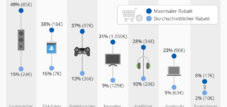When is it worthwhile for companies to rely on AI? Where is the efficiency and the break-even point?
Language selection 📢
Published on: September 8, 2024 / update from: September 8, 2024 - Author: Konrad Wolfenstein

When is it worthwhile for companies to rely on AI? Where is the efficiency and the break-even point? – Image: Xpert.Digital
💡 Business and Artificial Intelligence: The path to success with ROI
🔍 But the question of when investing in AI is really worthwhile and at what point a positive return on investment (ROI) is achieved is of central importance
Companies of all sizes and industries are faced with the decision of whether and when they should rely on artificial intelligence (AI). But the question of when investing in AI is really worthwhile and at what point a positive return on investment (ROI) is achieved is of central importance. The following explains when companies can benefit from AI, which factors determine the break-even point and how to optimally reach this point.
🌐 Artificial intelligence in a corporate context
AI is a collective term for technologies that enable machines to perform tasks that traditionally require human intelligence. These include machine learning, neural networks, deep learning, speech recognition and much more. Companies are using AI in various areas, including customer service, process automation, data analysis, and even creative processes such as new product development.
The benefits of AI for companies are diverse. It can help make processes more efficient, increase productivity, minimize errors and make better decisions by analyzing large amounts of data. These potentials make AI one of the most promising technologies for companies.
🧩 Factors for using AI
The use of AI in companies depends on several factors that determine whether and when an investment is worthwhile. The most important include:
1. Cost-benefit ratio
The first aspect is the question of costs. The introduction of AI often initially requires large investments in technology, infrastructure and employee training. Companies need to consider whether the potential cost savings and efficiency gains justify this expenditure. A frequently cited advantage of AI is the ability to automate repetitive tasks and thus reduce personnel costs. However, this assumes that the company has sufficiently repetitive processes where the use of AI actually makes sense.
2. Data availability
AI systems rely on large amounts of high-quality data. Companies that already have extensive data sets can use the technology better and more efficiently. Without enough data, it is difficult to train AI to actually provide valuable insights. Collecting, processing and analyzing data is therefore a crucial success factor for the use of AI.
3. Technological infrastructure
Companies must ensure that they have the necessary technical infrastructure to implement AI. This not only includes powerful servers or cloud systems, but also integration into existing systems and processes. If the infrastructure is insufficient, additional costs may arise, further delaying the break-even point.
4. Skilled labor shortage
Another critical factor is the know-how within the company. AI expertise is in demand, and the lack of qualified specialists can make the introduction of AI projects difficult. Companies that do not have in-house capacity must invest in external consulting or training to build the necessary skills.
📈 The break-even point: When does AI become profitable?
The break-even point is the point at which the returns or savings from the AI investment cover the costs. This point varies greatly from company to company and depends on various factors:
Size of the company
Larger companies often have more resources and can invest more quickly in the necessary infrastructure and know-how. Smaller companies, on the other hand, have to act strategically and calculate carefully whether investing in AI will be worthwhile in the short term.
Type of processes
Companies with many standardized, repetitive processes can benefit more quickly from AI. In such cases, the technology can bring significant efficiency gains after just a short period of time. Companies whose processes are more complex and customized may have to wait longer for their investments to pay off.
Area of application of AI
The break-even point also depends on the area in which the AI is used. For example, if technology is used in customer service to respond to queries more quickly or to create a higher level of customer experience, returns through customer satisfaction and loyalty can increase more quickly. However, in production automation, the savings through reduced personnel costs or increased production efficiency could also be felt early on.
🔍 How companies reach the break-even point
In order to reach the break-even point more quickly, companies should proceed strategically:
1. Start small pilot projects
A common misconception is that companies need to invest in AI at scale right away. A better approach is to start with small pilot projects that are manageable and can deliver results quickly. These projects can serve as a test run to better understand the technology and identify concrete benefits before it is rolled out widely.
2. Optimize data usage
Since AI is based on data, it is important to make optimal use of existing data resources. Companies should ensure that their data is clean, well-organized and accessible. By implementing effective data management systems and leveraging data analytics tools, companies can maximize the value of their AI applications.
3. Collaborate with experts
The skills shortage in the field of AI can be bridged by working with external consultants or through partnerships with universities and technology companies. This collaboration allows companies to benefit from external expertise and adopt industry best practices.
4. Long-term planning
AI is not a short-term solution. Companies should be aware that it may take some time for the full impact of the technology to become apparent. A long-term strategy is necessary to recoup the costs and fully realize the benefits. It is important to regularly measure progress and adapt the strategy accordingly.
🎯 When is AI worthwhile?
The decision as to whether the use of AI is worthwhile for a company ultimately depends on the company's specific circumstances. Companies that have sufficient data, a suitable infrastructure and the necessary specialist knowledge can benefit from the use of AI at an early stage. For other companies, it may make more sense to take small steps initially and implement the technology gradually.
A clear indicator that AI is useful is the ability to automate processes that are otherwise time-consuming and error-prone. It is also an advantage if the technology can be used to gain deeper insights into customer needs, market developments or operational processes.
The success and break-even point of AI investments depends heavily on proper planning and implementation. Companies should be strategic and methodical to ensure they are leveraging AI's full potential while controlling costs. AI is a powerful tool that can enable companies to remain competitive in the long term - provided they use it correctly.
📣 Similar topics
- 🤖 Artificial intelligence in a corporate context
- 💡 Factors for using AI
- 📈 The break-even point: When does AI become profitable?
- ⚙️ How companies reach the break-even point
- 🕵️♂️ When is AI worthwhile?
- 🧠 AI and machine learning in the company
- 💵 ROI of AI investments
- 🔍 Data usage and AI implementation
- 🏢 AI in various business areas
- 📊 Strategies for successful AI introduction
#️⃣ Hashtags: #ArtificialIntelligence #Company #BreakEvenPoint #ROI #DataAnalysis
We are there for you - advice - planning - implementation - project management
☑️ SME support in strategy, consulting, planning and implementation
☑️ Creation or realignment of the digital strategy and digitalization
☑️ Expansion and optimization of international sales processes
☑️ Global & Digital B2B trading platforms
☑️ Pioneer Business Development
I would be happy to serve as your personal advisor.
You can contact me by filling out the contact form below or simply call me on +49 89 89 674 804 (Munich) .
I'm looking forward to our joint project.
Xpert.Digital - Konrad Wolfenstein
Xpert.Digital is a hub for industry with a focus on digitalization, mechanical engineering, logistics/intralogistics and photovoltaics.
With our 360° business development solution, we support well-known companies from new business to after sales.
Market intelligence, smarketing, marketing automation, content development, PR, mail campaigns, personalized social media and lead nurturing are part of our digital tools.
You can find out more at: www.xpert.digital - www.xpert.solar - www.xpert.plus























